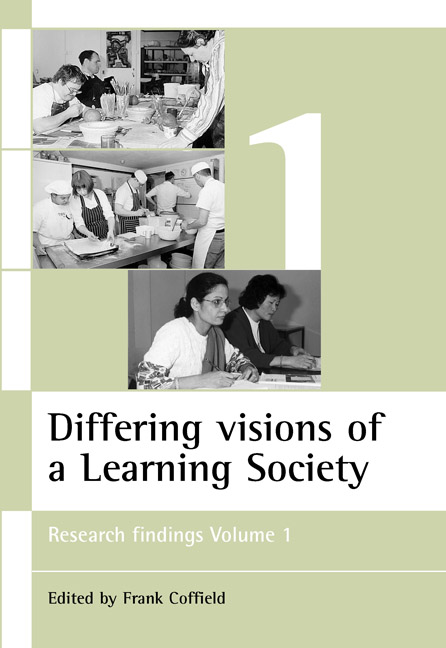Book contents
- Frontmatter
- Contents
- Notes on contributors
- Introduction: A critical analysis of the concept of a learning society
- one ‘Worlds apart’ – Education markets in the post-16 sector of one urban locale 1995-98
- two Unifying academic and vocational learning in England, Wales and Scotland
- three Skill development in higher education and employment
- four The variable contribution of guidance services in different types of learning societies
- five Changing patterns of training provision in the National Health Service: an overview
- six Working and learning in Britain and Germany: findings of a regional study
- seven Development of knowledge and skills at work
- Index
four - The variable contribution of guidance services in different types of learning societies
Published online by Cambridge University Press: 05 July 2022
- Frontmatter
- Contents
- Notes on contributors
- Introduction: A critical analysis of the concept of a learning society
- one ‘Worlds apart’ – Education markets in the post-16 sector of one urban locale 1995-98
- two Unifying academic and vocational learning in England, Wales and Scotland
- three Skill development in higher education and employment
- four The variable contribution of guidance services in different types of learning societies
- five Changing patterns of training provision in the National Health Service: an overview
- six Working and learning in Britain and Germany: findings of a regional study
- seven Development of knowledge and skills at work
- Index
Summary
Background
In recent years, labour markets have had to adapt to the twin pressures of globalisation and technological change. Increasingly, labour market participants are making frequent job changes in the course of their working lives. In the UK, the previous Conservative government's policy actively promoted the deregulation of the labour market, reducing the level of employment protection previously granted to the workforce. Companies ‘downsized’ and ‘delayered’, reducing their core of permanent workers and increasing their employment of part-timers and contract workers. Indeed, it has been argued that flexible employment contracts are bringing about the ‘death of career’ (Collin and Watts, 1996) and a dramatic reshaping of the employment relationship. Watts has referred to this process as the ‘Careerquake’ (Watts, 1996).
These changes have not, of course, affected all sections of the labour market with equal force. Overall, there has been little change in the average duration of job tenure (Burgess and Rees, 1997). However, the overall pattern disguises seismic shifts in career patterns among different segments of the labour force. Job security for male workers, measured by median length of job tenure, fell by 20% between 1975 and 1993, and labour turnover has risen dramatically for older workers and less skilled men (Gregg and Wadsworth, 1995). The decrease in length of job tenure for men has been offset by an increase in the length of job tenure for women, but this is in a context in which women in any case have a much higher share of part-time and temporary work. While a core of permanent employees has been insulated from these effects, there is much greater instability among the secondary labour market participants in part-time work, self-employment and other forms of ‘atypical’ work. Even within the core labour force, there is evidence of change. Comparing the recessions of 1980-82 and 1989-92, Inkson (1995) found that the proportion of managers changing jobs each year increased from 21% to 30%, while ‘discontinuities’ in managers’ career paths due to job severance were an increasingly common experience among managerial personnel. If job mobility becomes a more central component of post-fordist society, in contrast to the supposed traditional progression up a hierarchical career ladder, so the importance of life-long careers guidance will increase.
- Type
- Chapter
- Information
- Differing visions of a Learning Society Vol 1Research Findings, pp. 139 - 166Publisher: Bristol University PressPrint publication year: 2000
- 1
- Cited by



